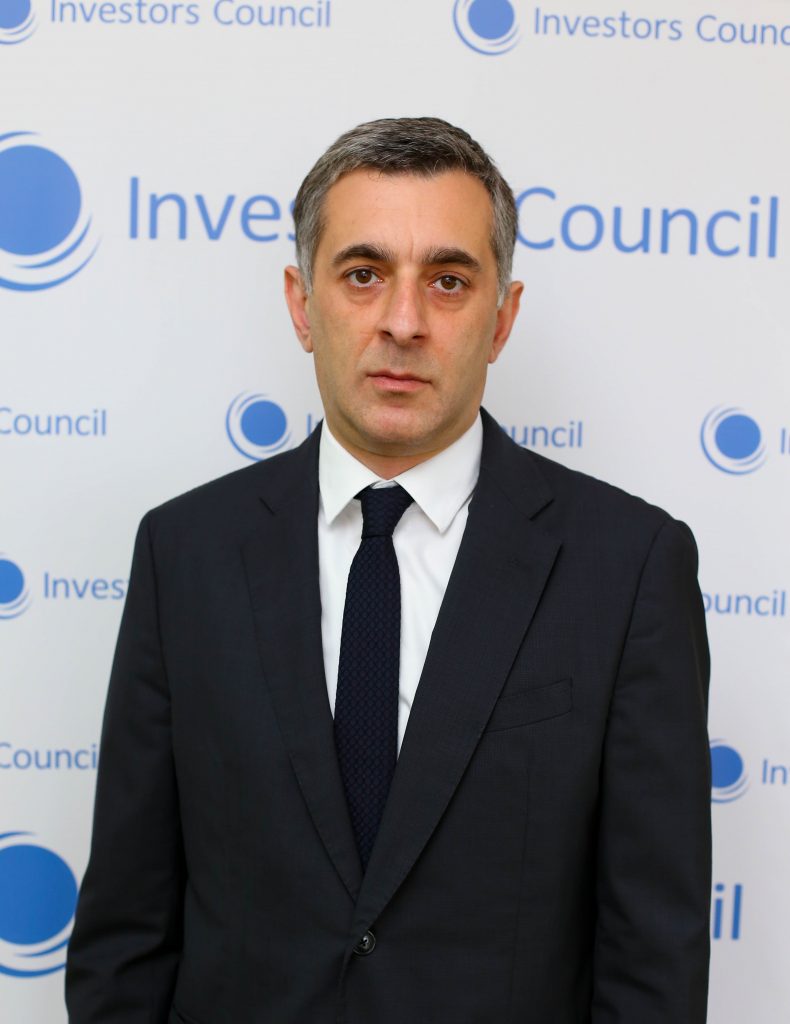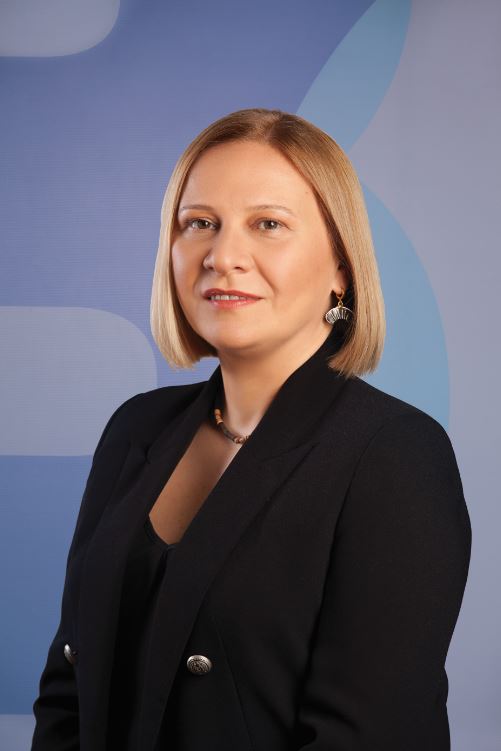The Investors Council’s activities in terms of Green Economy Development

The Investors Council was established in 2015 in accordance with the Memorandum of Understanding between the Government of Georgia and the European Bank for Reconstruction and Development (EBRD). It is funded by the UK Government’s Good Governance Fund (GGF) through the European Bank for Reconstruction and Development (EBRD) and is supported by the Government of Georgia.
The Investors Council represents an independent platform for public-private dialogue, which is chaired by the Prime Minister of Georgia. Its members include the European Bank for Reconstruction and Development (EBRD), the British Embassy in Georgia, state agencies (ministries), the Business Ombudsman, the International Finance Corporation (IFC), major business associations in Georgia, and the World Bank as an observer member.
For the purpose of fostering business and investment climate, the Investors Council promotes dialogue between the business community, international financial institutions, donors, and the Government of Georgia.
Starting from 2022, the Investors Council incorporated the green economy into its agenda. The Green Economy Transition, as one of the means to address climate change and reduce resource dependence, is one of the key focus areas in the Investors Council’s 2023-2024 Work Plan. In the forthcoming years, active efforts will persist towards green economy, gender equality, access to finance, innovation, and education to further the goals of sustainable development.

Giorgi Cherkezishvili, Head of the Investors Council Secretariat, discusses the platform’s activities, goals, priorities, and sustainability strategy.
What is the purpose of the Investors Council and the scope of its activities ?
The Investors Council aims to improve Georgia’s investment climate by means of constructive dialogue between the government and the private sector. Furthermore, through its initiatives and projects facilitates the fulfillment of the obligations under the Association Agreement with the European Union and Georgia’s accession to the European Union.
Since 2022, the comprehensive reform agenda of the Investors Council incorporates the Green Economy Transition (GET). The Green Economy Transition Working Group, comprising the representatives of business associations in Georgia, representatives of international financial institutions, and experts with sector-specific knowledge, is actively researching the initiatives for the Green Economy Transition. Green Economy Transition was integrated in the Investors Council’s 2023-2024 Work Plan and it represents one of the prioritized directions.
How important is the role of the private sector in effectively dealing with the global challenges?
Addressing these challenges necessitates active private sector involvement. Stimulating this engagement entails providing tailored support to businesses, to increase their awareness of the benefits derived from implementing sustainable development practices.
It’s noteworthy that during the Investors Council’s meetings, the green economy topic was raised by the Investors Council’s members several times. Obviously, the private sector’s preparedness positively influences the development dynamics of the green economy. With this regard, the mission of the Investors Council’s platform is to ensure compliance between all government initiatives related to the Green Economy and the needs of the private sector. This alignment will ensure a smooth transition process for businesses operating in Georgia.
Today, the green economy is not solely the choice of affluent countries. Given resource scarcity and climate change, it poses a significant challenge for all countries. The shift to a green economy holds paramount importance for country’s development, serving as a means to mitigate climate change and reduce resource dependence. Furthermore, it plays a pivotal role in enhancing country’s economic potential, elevating its attractiveness in the global market and fostering substantial investment inflow. Additionally, this transition gives rise to entirely new sectors, generating novel employment opportunities.
What measures should be taken by the State to ensure the transition to a green economy?
To facilitate the green economy transition, various structural reforms are necessary. The Investors Council’s Green Economy Transition Working Group is actively engaged in identifying these reforms.
One of the current initiatives entails incentivizing businesses to adopt sustainable and green practices by facilitating access to financing. The Investors Council, together with the European Bank for Reconstruction and Development is closely collaborating with “Enterprise Georgia” and “Rural Development Agency” to develop green finance instruments for state SME support programs. The project is currently in the implementation phase and hopefully, soon we will have a new support mechanism, which will significantly increase SMEs’ access to sustainable finance.
Furthermore, the Investors Council in collaboration with the EBRD, actively supports the Ministry of Environmental Protection and Agriculture of Georgia in the digitalization of environmental permits. This initiative seeks to simplify the permit acquisition process and enhance transparency. Digitalization will significantly streamline the procedure, allowing all interested parties to obtain permits promptly and transparently.
The Investors Council is also actively involved in the discussions and consultations regarding the Climate Change Law of Georgia developed by the Environmental Protection and Natural Resources Committee of the Parliament of Georgia and the Westminster Foundation for Democracy. The partnership’s aim is the involvement of the private sector, to incorporate the views and needs of the private sector into the final version of the law.
Noteworthy are the initiatives of the Investors Council in terms of access to finance, digitalization of services, and education, all contributing to reaching the sustainable development goals. The Investors Council, with the involvement of its member business associations and international financial institutions, supported the development of the legislation “On Covered Bonds”. The Law “On Covered Bonds” came into force three months after its publication (16.12.2022). Based on the law, the relevant secondary legislation of the National Bank of Georgia was issued on March 15, 2023.
In addition, the Investors Council was actively involved in the legislative process of the Law “On Securitization”. In order to develop this legislation, under the lead of the Ministry of Economy and Sustainable Development of Georgia, relevant discussion platforms – editing and working groups were created, where the representatives of the Investors Council participated together with various stakeholders. The Law “On Securitization” was adopted by the Parliament of Georgia in the third reading in December 2023.
The Investors Council launched research on the higher education sector in Georgia, in cooperation with the United Nations Development Program (UNDP), the Ministry of Education and Science of Georgia, and with the support of the Swedish Government. In recent years, the number of foreign students in Georgia has increased and the education sector makes a significant contribution to the economy. The comprehensive research, initiated by the Investors Council’s member business associations, aims to identify the reforms that support the education sector development, increase Georgia’s attractiveness on the international market and attract investments.
The Investors Council also works in the direction of innovation. What does the scope of this activity encompass?
The Investors Council’s aim is to improve the quality of digitalization of state services. With the support of the Investors Council and the leadership of the European Bank for Reconstruction and Development (EBRD), the following projects have been successfully executed: the unified digital tax and customs methodology platform of the Revenue Service of the Ministry of Finance of Georgia (infohub.rs.ge); the Port Community System project, which is in the implementation phase and is financed by the EBRD, the European Union, and the UK Government’s Good Governance Fund (GGF); The project of Application and Integration of Artificial Intelligence in Customs Formalities, the main part of which has already been completed; Digitalization of the Construction Permit and Administration Process for Buildings of Special Importance, which is currently being implemented.
Work is currently underway on the Investors Council’s 2024-2025 Work Plan. In addition to the topics raised by the Investors Council’s members, work will be actively continued in the direction of gender equality and green economy transition in the following years as well.




 Search
Search





